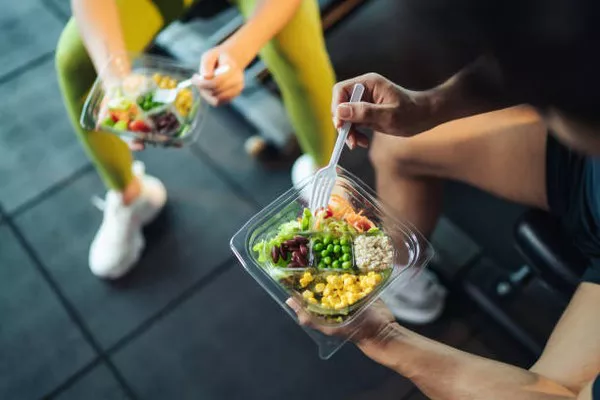Gaining muscle is a common goal for many fitness enthusiasts. Your post-workout nutrition plays a critical role in this process, especially if you exercise at night. The right foods can help repair and build muscle tissue, replenish energy stores, and optimize recovery. This article will provide specific suggestions on what to eat after a nighttime workout to gain muscle, as well as precautions to consider.
Importance of Post-Workout Nutrition
Muscle Recovery and Growth
Post-workout nutrition is essential for muscle recovery and growth. During exercise, muscle fibers undergo stress and small tears. Consuming the right nutrients after a workout helps repair these tears, leading to muscle growth.
Replenishing Glycogen Stores
Glycogen, the stored form of glucose, is the primary fuel source for your muscles during exercise. After a workout, especially an intense one, glycogen stores are depleted and need to be replenished.
Preventing Muscle Soreness
Proper post-workout nutrition can help reduce muscle soreness, allowing you to perform better in subsequent workouts.
Macronutrients for Muscle Gain
Protein
Protein is crucial for muscle repair and growth. It provides the building blocks (amino acids) necessary for muscle tissue repair and synthesis.
Carbohydrates
Carbohydrates replenish glycogen stores and aid in recovery. They also stimulate the release of insulin, which helps shuttle amino acids into muscles.
Fats
Healthy fats are essential for overall health and can provide a slow, sustained release of energy. However, fats should be consumed in moderation immediately after a workout as they can slow down digestion.
Specific Food Suggestions
Protein-Rich Foods
Lean Meats
- Chicken Breast: High in protein and low in fat, chicken breast is an excellent choice for muscle repair and growth.
- Turkey Breast: Similar to chicken, turkey breast provides high-quality protein.
Fish
- Salmon: Rich in protein and omega-3 fatty acids, salmon aids in muscle recovery and reduces inflammation.
- Tuna: Another great source of protein and omega-3s.
Dairy Products
- Greek Yogurt: High in protein and contains probiotics for gut health.
- Cottage Cheese: Contains casein protein, which is slow-digesting and ideal for nighttime recovery.
Plant-Based Proteins
- Tofu: A versatile source of protein for vegetarians and vegans.
- Lentils and Beans: Provide a good amount of protein and fiber.
Carbohydrate-Rich Foods
Whole Grains
- Quinoa: A complete protein source and rich in carbs.
- Brown Rice: Provides complex carbohydrates and fiber.
Fruits
- Bananas: High in carbohydrates and potassium, which helps prevent muscle cramps.
- Berries: Packed with antioxidants and carbs.
Vegetables
- Sweet Potatoes: Rich in complex carbohydrates and vitamins.
- Leafy Greens: Provide carbohydrates and are nutrient-dense.
Healthy Fats
- Avocado: Provides healthy fats and fiber.
- Nuts and Seeds: Offer a good balance of protein, fats, and carbs.
Meal Timing and Portions
Timing
Eating within 30 minutes to 2 hours after a workout is ideal for maximizing muscle recovery and growth. This window is often referred to as the “anabolic window.”
Portions
Balancing your macronutrient intake is crucial. A typical post-workout meal might include:
- Protein: 20-40 grams
- Carbohydrates: 40-80 grams
- Fats: 10-20 grams
Sample Post-Workout Meals
Meal 1: Grilled Chicken and Quinoa Salad
- Ingredients: Grilled chicken breast, quinoa, mixed greens, cherry tomatoes, cucumber, olive oil, lemon juice.
- Benefits: Provides high-quality protein, complex carbohydrates, and healthy fats.
Meal 2: Salmon and Sweet Potato
- Ingredients: Baked salmon, roasted sweet potatoes, steamed broccoli.
- Benefits: Rich in protein, omega-3 fatty acids, and complex carbs.
Meal 3: Greek Yogurt and Berries
- Ingredients: Greek yogurt, mixed berries, honey, chia seeds.
- Benefits: High in protein and antioxidants, with a moderate amount of healthy fats.
Precautions and Considerations
Avoiding Heavy Meals
Eating a heavy meal right before bed can disrupt sleep. Opt for lighter, nutrient-dense meals that are easy to digest.
Hydration
Staying hydrated is crucial for muscle recovery. Drink plenty of water before, during, and after your workout.
Food Sensitivities
Be mindful of any food sensitivities or allergies. Choose foods that your body tolerates well to avoid gastrointestinal discomfort.
Sleep and Recovery
Adequate sleep is vital for muscle recovery and growth. Ensure you get 7-9 hours of quality sleep each night.
See Also: What Is A Good Source Of Protein After A Workout
Supplements for Muscle Gain
Protein Powder
Protein powder can be a convenient way to meet your protein needs, especially if you have difficulty consuming enough protein through food alone.
Branched-Chain Amino Acids (BCAAs)
BCAAs can help reduce muscle soreness and improve recovery.
Creatine
Creatine is one of the most researched supplements for muscle gain. It can help increase muscle mass and improve performance.
Omega-3 Fatty Acids
Omega-3 supplements can reduce inflammation and support overall health.
Conclusion
Post-workout nutrition is a critical component of muscle gain, especially for those who exercise at night. Consuming the right balance of protein, carbohydrates, and fats can optimize muscle recovery and growth. Remember to eat within the anabolic window, stay hydrated, and get adequate sleep. With the right nutritional strategy, you can achieve your muscle-building goals more effectively.
Related Topics:
What Is A Good Source Of Protein After A Workout


